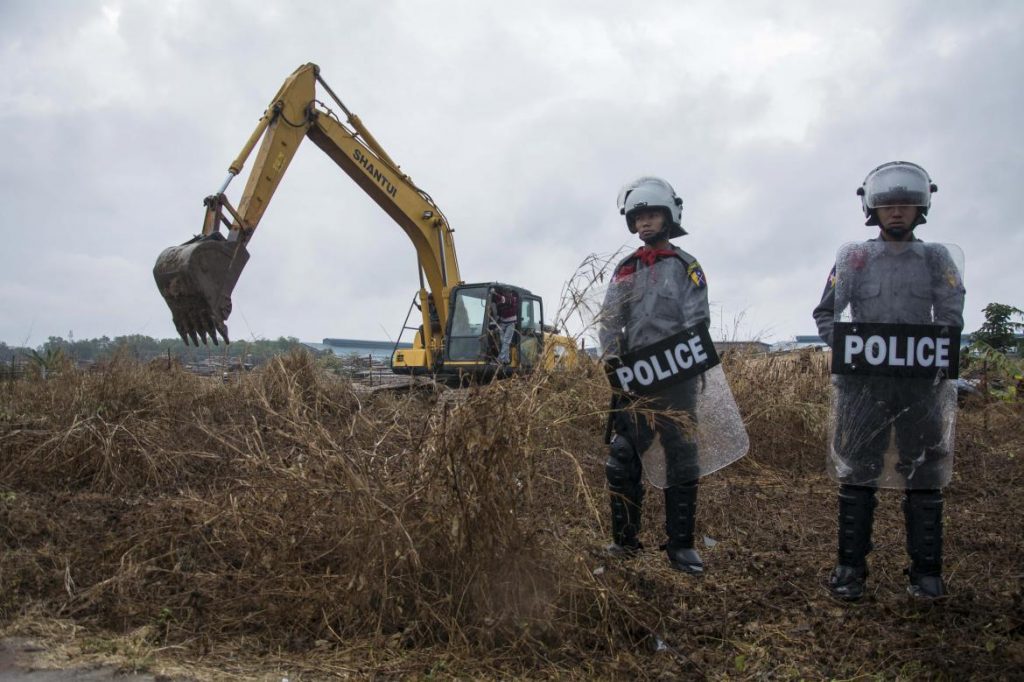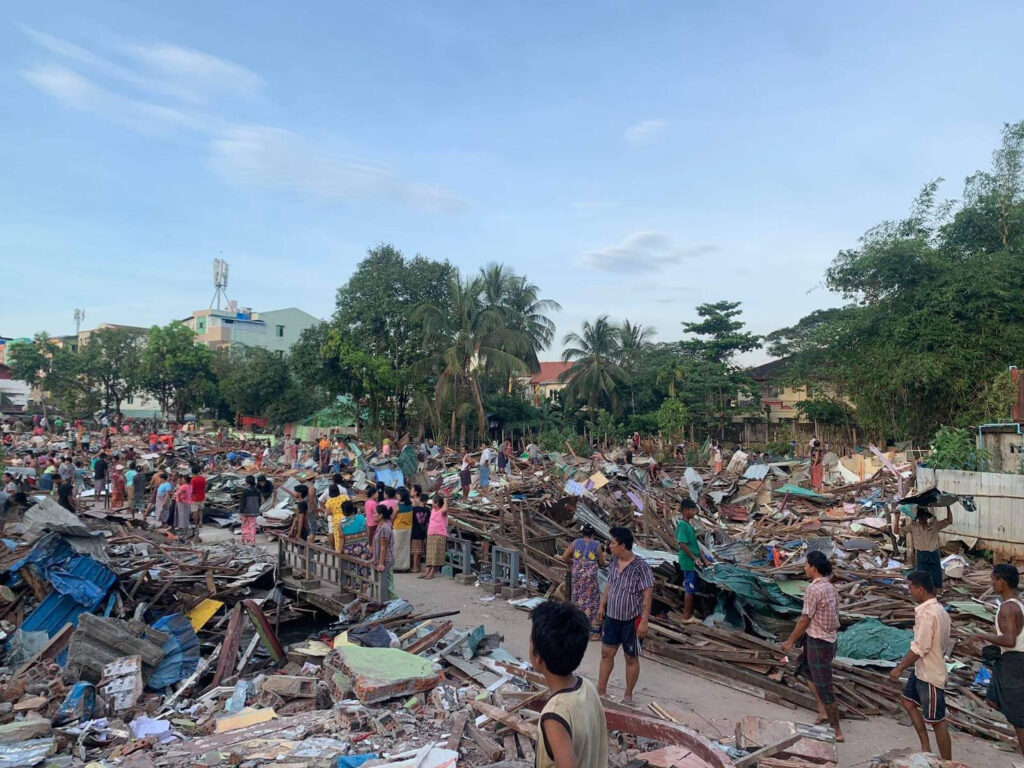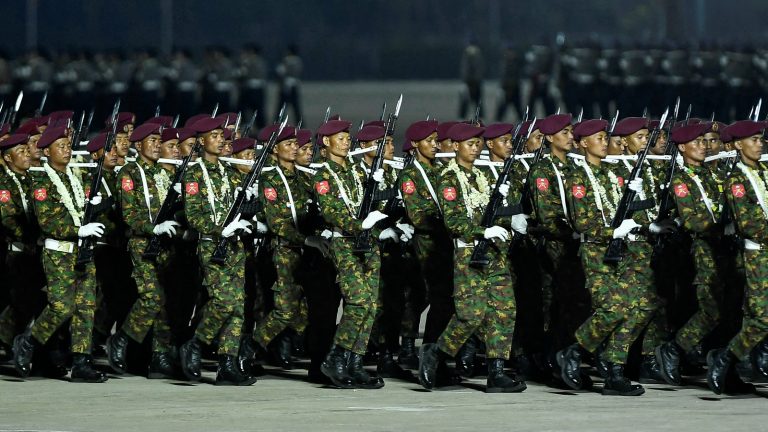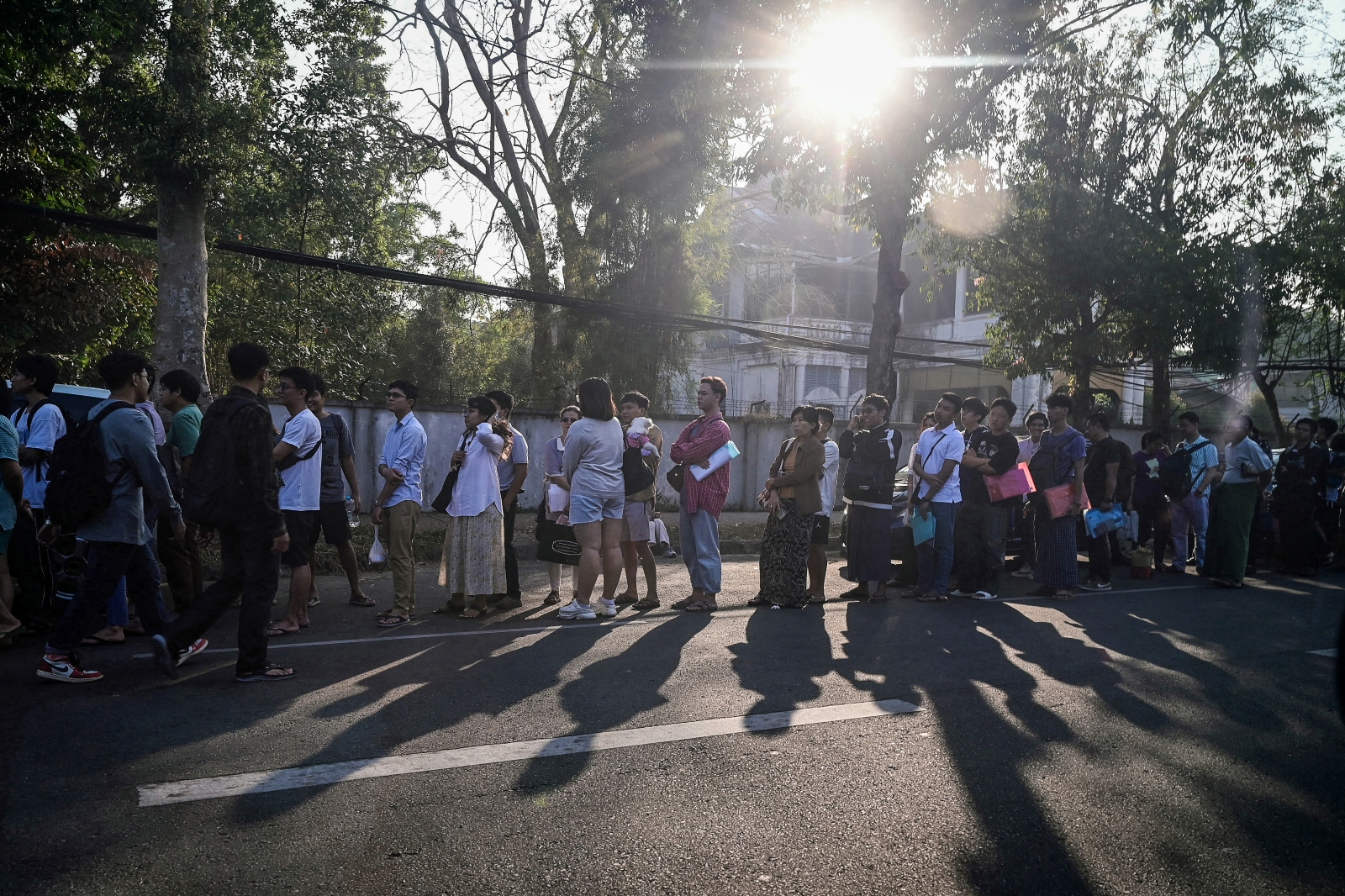Forced evictions, without compensation and with little or no notice, have ramped up in recent months in Myanmar and left tens of thousands of people destitute.
By FRONTIER
Thousands of people used to live in San Thamardi ward on Yangon’s northern outskirts. The neighbourhood, located within the Pyinma Pin Industrial Zone in Mingaladon Township, is near the Myanmar Beer factory, owned by the military conglomerate Myanma Economic Holdings Limited.
“When we arrived, this was grazing land. There was nothing, just a big field,” recalled Ko Zin Lin*. The 40-year-old native of Ayeyarwady Region was one of the first to settle there with his family, back in November 1997.
Zin Lin, whose wife is a migrant worker in Thailand, lived in a single-storey dwelling on a plot measuring 40 by 60 feet with his daughter until last month, when his reality crumbled.
“I tried for many years to have my own home, but now it’s been destroyed and I’m not sure when I can have it again,” he said.
On November 13, local officials accompanied by armed police and soldiers visited the ward to inform residents they had one week to clear out, claiming the land was owned by the military. The same bad news was also delivered to the residents of four other wards, which together with San Thamardi cover a total of 560 acres, home to tens of thousands of people.
“From then on, the bad luck started,” said a tearful Zin Lin.
On November 22, the authorities repeated the order to vacate, and this time, some families heeded the warning, although most remained in defiance. Three days later, security forces arrived in larger numbers, with around 500 police and soldiers accompanied by three bulldozers.
“My daughter and I sat and watched our house being bulldozed from end to end. When my daughter asked where she will sleep, I had no answer,” he said. “There was an uproar in the neighbourhood that day; some people cried.”
“Suddenly we had no home. Our family had nowhere to live. It wasn’t easy to move, to change. It’s very hard to live,” said Zin Lin, who is temporarily living at a friend’s house.
Zin Lin’s home was one of more than 10,000 to be demolished, leaving more than 40,000 people homeless in Mingaladon alone.
Mingaladon is one of the most militarised townships in Yangon, hosting an air force base, army cantonments, the infamous interrogation centre Ye Kyi Ain, multiple military hospitals and a military-run medical school.
“Forced evictions from Mingaladon are only part of the story. Violent arbitrary housing demolitions continue across the country,” said United Nations experts Mr Balakrishnan Rajagopal and Mr Thomas Andrews in a statement on December 2.
“The Myanmar Military is forcibly evicting over 50,000 people from informal settlements and systematically destroying homes in a fundamental violation of core human rights obligations,” the statement said.
It said that 150 homes were also bulldozed in Yangon’s Mayangone Township on November 19, after their occupants were given just 30 minutes to leave, and 5,000 people were evicted “overnight” on November 21 in Mandalay city’s Chan Myay Tharzi Township.
In Mandalay Region’s Pyin Oo Lwin, a hill town that hosts the country’s main military academy, 200 shops and houses were similarly ordered vacated in November.
The UN experts said, “depending on the context”, these forcible evictions and destruction of homes “can be prosecuted either as a war crime, a crime against humanity, or both”.
“It is the responsibility of the international community to ensure that those responsible for such crimes face international justice,” the statement said.

‘Everything was demolished’
In March, junta spokesperson Brigadier-General Zaw Min Tun defended a previous round of evictions and demolitions, saying “squatters” are being evicted in line with the “rule of law”.
The first mass evictions in Yangon during the more recent spree took place on November 19, with residents forced out of 150 houses in Mayangone’s ward three. The houses, which were then destroyed, were close to a housing compound built by Htoo Group, owned by tycoon U Tay Zar, who has been accused of brokering arms deliveries to the military. However, as in other cases, Frontier could not determine what motivated the evictions.
When Frontier visited in late November, the site was littered with broken bricks and discarded building materials.
“Everything was demolished in one day,” said Ko Min Tun, 28, whose house was bulldozed on November 19.
He said the residents of about half of the 150 houses destroyed by the army had lived there for nearly 50 years.
“Our father lived here since birth. We weren’t squatters,” Min Tun said.
The junta issued orders to vacate on November 16, and residents tried to visit the local office of the General Administration Department the following day but found it closed for the National Day holiday.
The next day, some regime forces allegedly pressured residents to sign a document agreeing to leave their homes. Among them was Daw Aye Me* who lived in a wooden house on a 20 by 60 foot plot of land.
“I was forced to do it,” she said, accusing security forces of covering up the contract so she couldn’t even read what she was agreeing to. “The next morning was hell and I will never forget it.”
On the morning of November 19, about 30 soldiers, police, electricity supply workers and men in civilian clothes gathered at the ward.
“They said we had half an hour to remove our belongings from our houses. And the roads were closed in and out,” Aye Me said. “I didn’t even have enough time to gather my clothes from my home.”
Thirty minutes later, on cue, the demolitions began. Aye Me said she left the area and when she returned at about 3pm, the neighbourhood had been flattened.
“My house was destroyed,” she said, estimating the house and property were worth K30 million.
Min Tun said the loss of his family home was difficult to accept, even beyond the financial hit.
“We lost the place where my father grew up and where I grew up,” he said.
While military-backed evictions appear to have surged since the February 2021 military coup, and particularly in more recent months, they are far from a new phenomenon. Some residents of San Thamardi ward were similarly removed and had their homes bulldozed in 2016, with security forces claiming the land belonged to MEHL, the military conglomerate.
U Tun Tun Win*, who has lived in the ward for more than 10 years, said most residents returned to live in the area after the 2016 demolitions because they had paid money for the land and felt they had ownership, despite not having land deed certificates.
Min Tun admitted he did not have an ownership certificate for his plot in Mayangone even though his family had lived there for decades.
“Because our ancestors have been living here for generations, we understand that this land is our own,” he said.
Tun Tun Win said the authorities should have erected no-trespassing signs if they did not want people buying and living on the land.
“If the land is owned by the military, they should erect a sign saying it’s military owned. I wouldn’t buy such land or want to live on it,” he said.
Min Tun pointed out that government electricity supply officials had even installed metre boxes for the homes. “Even on the day the house was set to be demolished, we had to pay bills. If we are illegal squatters, why would the government install metre boxes?” he asked.
The destruction has also left those who still have homes in the targeted areas in a state of constant anxiety. Daw Theingi*, 68, and her family have lived in ward three in Mayangone for nearly 50 years, but like many others, has no official land ownership certificate.
“I can’t sleep at night,” she said. “If they ask us to leave, I don’t know where we’ll go.”
For some affected by the demolitions, the mental toll has been too much to bear.
Tun Tun Win said one man from Mingaladon had killed himself after his house was torn down.
“He had nowhere to live and couldn’t afford to rent, so he committed suicide,” he said. “Many residents can’t afford to rent and it’s hard to find a place to stay. It’s a crisis for them.”
At least two other distraught residents reportedly took their own lives after the demolitions.
For Zin Lin and his daughter, life is now a daily struggle.
“My daughter can’t attend school and I don’t have enough money to pay rent,” he said. “My daughter doesn’t want to live in someone else’s house. When she asks when we’re going home, I feel like I want to cry.”
“Our way of life is dead. I blame it on bad luck. I’m facing these difficulties because I was born in this country.”
*denotes use of a pseudonym for security reasons







